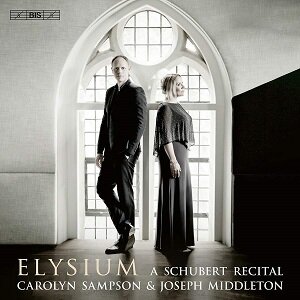
Franz Schubert (1797 – 1828)
Elysium
Carolyn Sampson (soprano)
Joseph Middleton (piano)
rec. 2020/21, Potton Hall, Saxmundham, UK
Sung texts with English translations enclosed.
Reviewed as download from press preview.
BIS BIS-2573 SACD [68]
Carolyn Sampson began her career as a baroque specialist, and being engaged in Masaaki Suzuki’s recording project of Bach cantatas on BIS, she early developed a relationship with the adventurous Swedish company, which covers most of the new millennium. By and by, she ventured into art songs, and I have had the good fortune to be able to review some of her albums. Most recently it was a recording of Hugo Wolf’s Italienisches Liederbuch (review), less than a year ago, and a few years earlier A Verlaine Songbook (review).
Her latest offering, the thematic recital Elysium, brings us back to what Susan Youens in her liner notes describes thus: ”Mythological Elysium was first a paradise for heroes on whom the gods conferred immortality, then an afterlife for all the blessed dead. In Homer, the Elysian Plain was a realm of perfect happiness at the end of the flat earth, on the banks of the Oceanus (the river that encircled the outer boundary of Earth), while Virgil in Book 6 of The Aeneid makes it a special territory within the Underworld. But it is also a state of mind, our capacity to know bliss in life and to expect Death to open up to still more rapture.” Poets, both minor talents and giants like Goethe and Schiller, have repeatedly visited these shores and Schubert was inspired by these motifs to some of his best and most frequently heard songs, as well as some relative rarities. To the former category belong for instance Goethe’s Ganymed, An den Mond and Der Musensohn, Graf Friedrich Leopold zu Stolberg-Stolberg’s Auf dem Wasser zu singen, Jacob Nicolaus Craigher de Jachelutta’s Die junge Nonne, Matthäus von Collin’s Nacht und Träume and Friedrich Rückert’s Du bist der Ruh. I should perhaps add Litanei auf das Fest Allerseelen, which is one of my personal favourites among Schubert’s songs. I have of course heard most other songs as well, since I collected the Hyperion series in the 1990s and the Naxos series a decade later and also have the DG-box with Fischer-Dieskau/Gerald Moore from the 1970s and Mathias Goerne’s Harmonia Mundi set from some ten years ago – and a respectable bunch of other discs, too. Not everything sticks in the memory the first time one hears it, but time and again I find that when I hear a Schubert song I don’t remember having heard before, I admire it. On this album, I was quite taken aback by the spooky but beautiful and atmospheric Schwestergruss, and Schiller’s ode Elysium, which lends its title to the whole collection, stands out as a grand and jubilant homage to Elysium – a manifesto if you like. Even the little melodrama Abschied von der Erde, which concludes the programme, comes as a touching postscript.
Carolyn Sampson is not an interventionist interpreter in the line of Fischer-Dieskau with expressive word-painting and strong contrasts. She works with smaller means, is careful with nuances and paints in water colours rather than oil. But she has the power to handle the dramatic songs as well, and there she has some steel in the voice. I am talking about Schiller’s quite overwhelming Elysium from 1817 in the first place, but also Die junge Nonne, the nun who in the midst of raging storms and thunder and lightning strives to be admitted into heaven – and succeeds. It is one of Schubert’s most dynamic and harmonically most daring creations, and Carolyn Sampson brings it to a triumphant fulfilment. Occasionally her vibrato becomes slightly wider under pressure, something I also commented on when I reviewed Italienisches Liederbuch, but it is still a fresh voice, free from wear, backed up by the sensitive and flexible Joseph Middleton at the piano, so this recital that should satisfy all Schubert lovers. It was recorded in Potton Hall at about the same time as the Wolf disc, so prospective buyers can rest assured that the sound is up to the general high standard we expect from a BIS recording, and Susan Youens’ liner notes are a reliable guide on our journey to the Elysian fields.
Göran Forsling
Help us financially by purchasing from



Contents
Schwestergruß (1822), D 762 6’28
Text: Franz von Bruchmann
Ganymed (1817), D 544 3’56
Text: Johann Wolfgang von Goethe
An den Mond (1815—26), D 193 3’10
Text: Ludwig Christoph Heinrich Hölty
Auf dem Wasser zu singen (1823), D 774 3’36
Text: Graf Friedrich Leopold zu Stolberg-Stolberg
Die junge Nonne (1825), D 828 4’38
Text: Jacob Nicolaus Craigher de Jachelutta
Gott im Frühlinge (1816), D 448 1’56
Text: Johann Peter Uz
Nacht und Träume (1823), D 827 4’20
Text: Matthäus von Collin
Die Sterne (1828), D 939 3’06
Text: Karl Gottfried von Leitner
An den Mond (1815), D 259 3’30
Text: Johann Wolfgang von Goethe
Litanei auf das Fest Allerseelen (1816), D 343 4’50
Text: Johann Georg Jacobi
An die Nachtigall (1816), D 497 1’22
Text: Matthias Claudius
Der Musensohn (1822), D 764 2’07
Text: Johann Wolfgang von Goethe
Der liebliche Stern (1825), D 861 3’00
Text: Ernst Schulze
Wiegenlied (1826), D 867 5’18
Text: Johann Gabriel Seidl
Du bist die Ruh (1823), D 776 4’24
Text: Friedrich Rückert
Elysium (1817), D 584 7’47
Text: Friedrich von Schiller
Abschied von der Erde (1826), D 829 2’47
Text: Adolf von Pratobevera


















